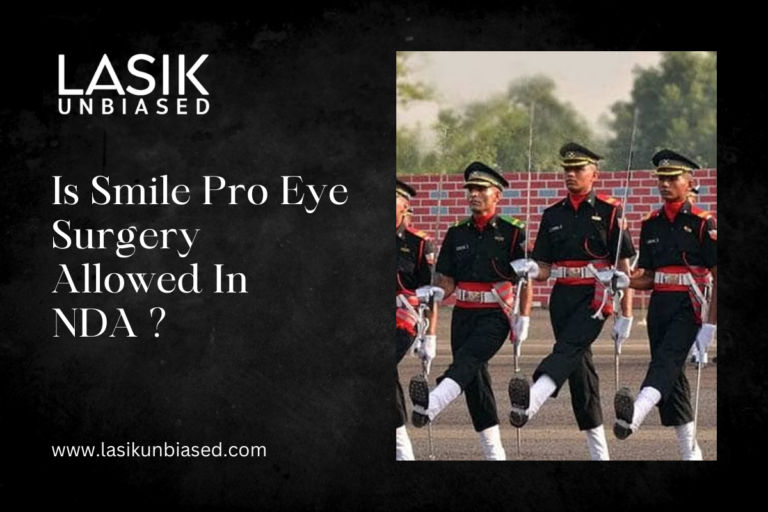Understanding the NDA Vision Requirements
The National Defence Academy (NDA) has strict medical and vision requirements for candidates aspiring to join the Indian Armed Forces. Since military personnel require excellent eyesight for operational efficiency, any corrective eye surgery undergoes careful evaluation. While LASIK and PRK have been reviewed for eligibility, candidates often wonder if Smile Pro eye surgery is permitted for NDA selection. Smile Pro is a newer, minimally invasive procedure to correct refractive errors. Still, its acceptance in NDA depends on various factors, including stability, corneal health, and long-term visual performance.
What is Smile Pro Eye Surgery?
Smile Pro, also known as Small Incision Lenticule Extraction (SMILE), is an advanced laser vision correction procedure. Unlike LASIK, which creates a corneal flap, Smile Pro uses a femtosecond laser to make a small lenticule in the cornea, which is removed through a tiny incision. This technique preserves more corneal strength, reduces the risk of dry eyes, and offers a faster recovery period. Since Smile Pro is minimally invasive and provides stable vision correction, many candidates wonder if it meets NDA’s medical standards for eye health and vision eligibility.
NDA’s Stance on Refractive Eye Surgeries
The NDA medical examination guidelines specify clear criteria for vision standards, including restrictions on certain types of corrective surgeries. Traditionally, PRK and LASIK have been considered for eligibility, provided that the surgery was performed after a specific age, vision remains stable, and the corneal thickness meets safety requirements. However, Smile Pro is a relatively newer technology, and its acceptance in NDA medical evaluations depends on updated guidelines issued by the Armed Forces Medical Board (AFMS). Since NDA has strict eye surgery rules, candidates must verify the latest regulations before considering Smile Pro for vision correction.
Eligibility Criteria for NDA After Smile Pro Surgery
NDA medical boards assess vision stability, corneal health, and overall eye condition for any candidate who has undergone refractive surgery. To be eligible after Smile Pro surgery, candidates must meet the following general conditions:
- The surgery should have been performed after age 20, as younger candidates may still experience vision changes.
- Vision must be stable, with no significant fluctuations in refractive power, for at least six months to a year after surgery.
- Corneal thickness should remain within acceptable limits, as skinny corneas may lead to disqualification.
- The candidate must have clear vision without dependence on glasses or contact lenses.
Since the final decision depends on medical evaluation, candidates must consult an authorized defence medical examiner before proceeding with Smile Pro surgery if they plan to join NDA.
Risks and Considerations of Smile Pro for NDA Candidates
While Smile Pro offers excellent vision correction, NDA candidates must consider potential risks that may impact eligibility. Dry eyes, night glare, or visual disturbances can occur in rare cases, and even minor irregularities in corneal healing may lead to disqualification. Since NDA training involves rigorous physical activity, combat readiness, and exposure to extreme environmental conditions, the medical board ensures that candidates’ eyes can handle such challenges without complications. Though Smile Pro is known for preserving corneal integrity, individual healing responses vary, making it crucial for candidates to undergo thorough eye evaluations before applying for NDA.
Alternatives for NDA Aspirants With Vision Issues
For candidates with mild refractive errors who do not wish to undergo surgery, alternative options include specialized contact lenses or prescription glasses that meet NDA standards. Some candidates may qualify under specific vision categories even with minor vision limitations. PRK and LASIK remain more commonly accepted procedures, provided they meet the medical board’s requirements. For those with severe refractive errors, consulting an ophthalmologist specializing in defence medical standards can clarify whether vision correction is necessary and which procedure is best suited for NDA eligibility.
How to Prepare for NDA Medical Examination After Smile Pro Surgery
Candidates who have undergone Smile Pro and wish to apply for NDA must be fully prepared for the medical examination. Scheduling a pre-medical assessment with a defence medical expert helps identify potential concerns that could lead to disqualification. Maintaining stable vision, following post-surgery care instructions, and undergoing regular eye check-ups can help ensure a successful evaluation. Additionally, candidates should keep all medical records, including pre-surgery prescriptions, surgical details, and post-operative reports, to provide to the medical board during the NDA assessment.
Final Verdict: Is Smile Pro Allowed in NDA?
Currently, NDA guidelines primarily recognize PRK and LASIK under specific conditions, but Smile Pro’s acceptance depends on updated medical board evaluations. Since Smile Pro is a newer procedure, candidates should check the latest NDA medical eligibility criteria before surgery. While Smile Pro offers several advantages, NDA medical standards remain strict to ensure that candidates meet the high visual demands required for defence services. The best approach is to consult an NDA-approved medical examiner for guidance and undergo a thorough eye evaluation before applying.


